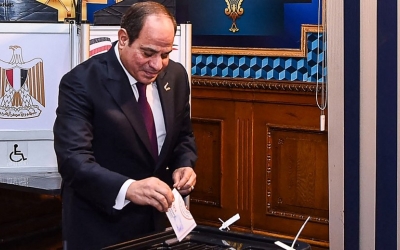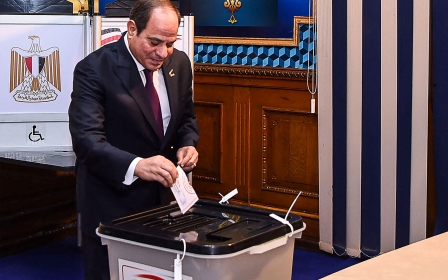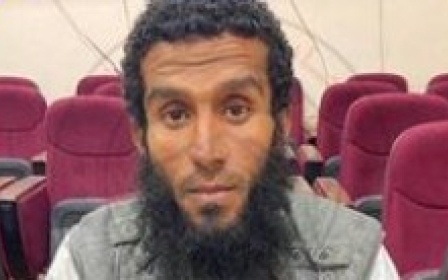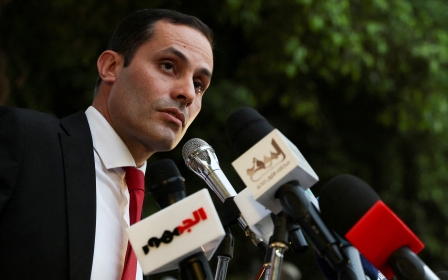Egypt’s President Sisi sworn in for third term after decade of repression and economic malaise
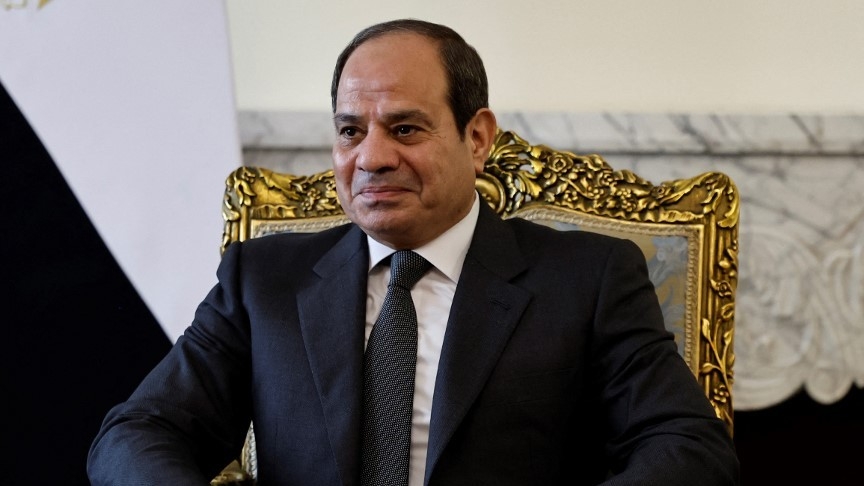
Egyptian President Abdel Fattah el-Sisi was sworn in on Tuesday for a third term in office after 10 years of rule marked by economic decline and political repression.
Sisi is slated to serve until 2030. On Tuesday, he vowed "to realise the aspirations of the Egyptian nation to build a modern, democratic state". He also promised to shore up public spending on social security programmes for the poor.
Sisi, 69, first became president in June 2014, a year after ousting his democratically elected predecessor Mohamed Morsi in a military coup.
Sisi, then defence minister, has since led a ferocious crackdown on his opposition, initially targeting members and supporters of the Muslim Brotherhood, the group from which Morsi hails. He then extended the crackdown to members of the secular and left-wing opposition, along with civil society and independent media.
An estimated 65,000 political prisoners detained in the aftermath of Sisi’s coup languish in jails, including politicians, protesters, journalists and civil society activists.
Sisi's campaign on the opposition has been decried as the worst human rights crisis in the country's modern history. In one day, security forces killed more than a thousand anti-Sisi protesters in August 2013, in what became known as the Rabaa Massacre.
Torture has also become widespread under Sisi's rule. A legal analysis by local and international rights groups has concluded that torture under the government of Sisi amounts to a crime against humanity.
The classification is due to the systematic and widespread use of torture in the country, including a pattern of beatings, electrical shocks, sexual violence and denial of medical care.
Sisi inaugurated his term inside the parliament building of his New Administrative Capital (NAC), a $58 bn “smart city”, which the president hailed as one of the blueprints of his rule.
NAC, which has yet to have a name, is located some 45 kilometres (28 miles) east of the capital Cairo. He is expected to relocate to his new presidential palace in the city from Tuesday. The parliament, key ministries and government agencies are also due to be relocating to the city from Cairo.
Funded by Egyptian public resources, the project was planned to be completed in three phases, with the first phase scheduled to be complete by 2020. But the first phase has yet to be completed due to lack of funds.
The city is aimed at relieving congestion in Cairo proper, but economic experts have questioned the feasibility of the project for Egypt’s ailing economy.
It is part of President Sisi’s Egypt Vision 2030, a sustainable development plan with goals to be met by 2030.
Rising poverty
Sisi did not present a detailed electoral platform at the beginning of his rule 10 years ago. But he made broad promises to improve the living standards of the population and to protect the poorest segments of society.
Economic indicators, however, have consistently worsened over the past decade.
Egypt is the most populous country in the Arab world, with a population of 106 million people.
The World Bank estimated that nearly 30 percent of its population was poor in 2019 and many millions more are at risk of falling below the poverty line.
Poverty has increased from 26.3 percent in 2013 to 29.7 percent in 2020, according to the latest figures released by the government’s main statistics agency, Central Agency for Public Mobilisation and Statistics (CAPMAS).
Poverty is expected to be much higher now after the the Covid-19 pandemic, the Russia-Ukraine war, and an economic policy centred on borrowing and overspending on megaprojects. Egyptian economists estimate the 2023 poverty rate to be at least 35.7 percent.
Egypt's headline inflation reached 33.7 percent in December, and is expected to reach a peak of 45 percent in the fourth quarter of 2024, according to Oxford Economics think tank.
The Egyptian pound has dwindled by more than 600 percent since Sisi came to power in 2014, when it traded at about seven to the dollar.
Since February, global partners including the International Monetary Fund, the World Bank, the European Union and the United Arab Emirates have signed various deals worth more than $57bn in what is seen as a rescue package for the cash-strapped Sisi government.
A massive $35bn deal with the UAE in February to build a new city on Egypt’s north coast boosted the government’s confidence to take the difficult decisions of floating the currency, one of the bailout conditions by the IMF.
Prior to the latest deals, during the last 10 years of Sisi’s rule, Egypt’s debt had more than tripled to $165bn. Egypt has also paid $132bn in instalments and interest on external debt over the same period, with debt payments accounting for most of the government's expenditure. Meanwhile, foreign currency reserves stood at only $35bn in February.
Sisi’s government has also failed to allocate the constitutionally mandated percentage of the budget to education and healthcare.
In the 2023-24 budget, the government allocated 1.94 percent of the expected GDP to education, a fraction of the six percent required by the 2014 constitution.
The same applies to healthcare allocations, which amounted to only 1.5 percent of the projected GDP in this year’s budget, compared to three percent mandated by the constitution.
Fighting terrorism
Combating terrorism was one of the main pledges of Sisi at the beginning of his rule. The Egyptian military fought an Islamic State insurgency in the Sinai Peninsula for years until it announced the defeat of the group in 2022.
The campaign, however, has been denounced by rights groups for having a disproportionate impact on the local population.
Human Rights Watch has accused the Egyptian army of possible war crimes against the tribal population of North Sinai, including mass displacement and extrajudicial killings.
The Egyptian army has also been accused of failing to hold members of the Islamic State accountable for alleged atrocities, and instead granting them amnesty.
A senior IS leader behind an attack that killed more than 300 civilians in a Sinai mosque in 2017 was released by the Sisi government in 2021 after an amnesty deal, two rights groups revealed last month.
Middle East Eye propose une couverture et une analyse indépendantes et incomparables du Moyen-Orient, de l’Afrique du Nord et d’autres régions du monde. Pour en savoir plus sur la reprise de ce contenu et les frais qui s’appliquent, veuillez remplir ce formulaire [en anglais]. Pour en savoir plus sur MEE, cliquez ici [en anglais].


